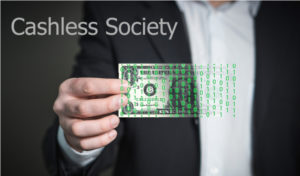
When you consider good governance vs bad governance, Sweden typically falls into the good camp. Life is pretty good if you’re a Swede. But a recent push by central banks to adopt a cash-free-society has put many on edge.
Riksbank governor, Stefan Ingves, says going cash-less is for the “collective good” of society. “Most citizens would feel uncomfortable to surrender these social functions to private companies,” he said. “It should be obvious that Sweden’s preparedness would be weakened if, in a serious crisis or war, we had not decided in advance how households and companies would pay for fuel, supplies and other necessities.”
But 72- year old former national police commissioner, Bjorn Ericksson, sees some big time risks. “When you have a fully digital system you have no weapon to defend yourself if someone turns it off,” he says. “If Putin invades Gotland [Sweden’s largest island] it will be enough for him to turn off the payments system. No other country would even think about taking these sorts of risks, they would demand some sort of analogue system.”
Mattias Karec, 29, a digital security consultant, points to problems with credit card, and even pension, fraud. “We are lucky that the people who know how to hack into them are on the good side, for now,” he says. “But we don’t know how things will progress. It’s not that easy to attack devices today, but maybe it will become easier to do so in the future.”
David Crouch writes for The Guardian:
The banks recognise that digital payments can be vulnerable, just like cash.
“Of course there are people trying to abuse them, but they are no more vulnerable than any other method of payment,” says Per Ekwall, a spokesperson for Swish, the immensely popular mobile payments system owned by Sweden’s banks.
“From a macro perspective Swish has made it safer, and cheaper,” he says. There is little point in fighting a trend that customers themselves are driving, the banks argue.
But an opinion poll this month revealed unease among Swedes, with almost seven out of 10 saying they wanted to keep the option to use cash, while just 25% wanted a completely cashless society. MPs from left and right expressed concerns at a recent parliamentary hearing. Parliament is conducting a cross-party review of central bank legislation that will also investigate the issues surrounding cash.
The Pirate Party – which made its name in Sweden for its opposition to state and private sector surveillance – welcomes a higher political profile for these issues.
Look at Ireland, Christian Engström says, where abortion is illegal. It is much easier for authorities to identify Irish women who have had an abortion if the state can track all digital financial transactions, he says. And while Sweden’s government might be relatively benign, a quick look at Europe suggests there is no guarantee how things might develop in the future.
“If you have control of the servers belonging to Visa or MasterCard, you have control of Sweden,” Engström says.
“In the meantime, we will have to keep giving our money to the banks, and hope they don’t go bankrupt – or bananas.”
Read more here.


